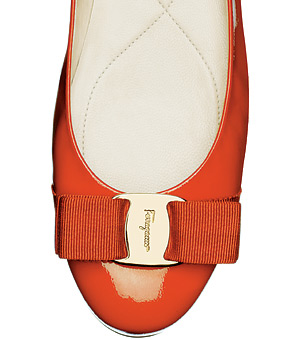
Salvatore Ferragamo, Varina ballet flat, $395
(2 of 3)
While the Ferragamo Group's business is clearly the children's first love, they each maintain their own interests. Chairman Ferruccio's Il Borro estate produced 150,000 bottles of Tuscan red and white wine last year, while Castiglion del Bosco is owned by Massimo, chairman of Ferragamo USA. As for Leonardo's "sidelines," in 1998 he purchased the majority of the shares of Nautor, the Finnish company and producer of Swan sailing boats. He is now also chairman of Camper & Nicholsons Yachting Ltd., the historic English yard. Leonardo's day jobs include acting as CEO of Palazzo Feroni Finanziaria S.p.A. (the holding company for Ferragamo's diversified strategies and investments) and chairman of Lungarno Alberghi (the wholly owned subsidiary hotel group, which is not branded Ferragamo and is particularly popular with visiting Gucci staffers because the competing brand also has headquarters in Florence). "Our hearts are always first and foremost with Ferragamo," says Massimo, "but we want to have fun with other, separate activities too."
As for the approaching IPO, "the process pushes you to rationalize the unrational" is how Leonardo puts it, referring to the way in which family companies tend to grow organically and then reach a stage, however successful, when new structures must be put in place to compete in the ever-more-complex business world. But this is not to imply that Ferragamo isn't already a significant luxury-goods player. In addition to its presence in mature markets and its growth in Central and South America, India and the Middle East, Ferragamo can justly boast of being big in China. Established in Shanghai in 1994, Norsa says it is now one of the top four most-recognized luxury brands in the booming Chinese market (the others—Louis Vuitton, Gucci and Chanel—are far bigger businesses).
Ferruccio, who ceded the title of CEO to Norsa, explains that the company is moving into its third era with the aim of "revolutionizing the way it is organized to keep what we inherited strong." The first era, he says, was "my father, starting from scratch until he passed away 47 years ago." Next, "the generation of seven entrepreneurs, being my mother and we six children, who inherited a well-known but tiny business." Today, with 67 descendants and a company that makes more than a million pairs of shoes a year—not to mention bags and leather goods, scarves, men's and women's wear and fragrances, as well as sunglasses and watches, the latter two under license—a new strategy is needed. "With the IPO, cousins can sell out if they want at the listed price, while [to see off hostile raids] of course we have a holding company to treasure the majority shareholding. You hope the next generations will be wise, but things change, and it is not right for us to decide today what they might do in the future," says Ferruccio.
While Norsa's mission is to ramp the company up a notch, there's been no snoozing on the family's watch. Years ago the second-generation Ferragamos, mindful of the way other Italian family-owned companies were imploding, wrote a rule book, which decreed that a maximum of three members of the subsequent generation could be voted into the firm. "Not six," emphasizes Ferruccio, "so it could not be one child from each of us." Candidates have to be fluent in English, educated at the M.B.A. level and possess outside work experience to ensure "they respect their boss and come to work on time," Ferruccio says. "We knew if we didn't have rules, those that would join would be the weakest while the entrepreneurs would go elsewhere."